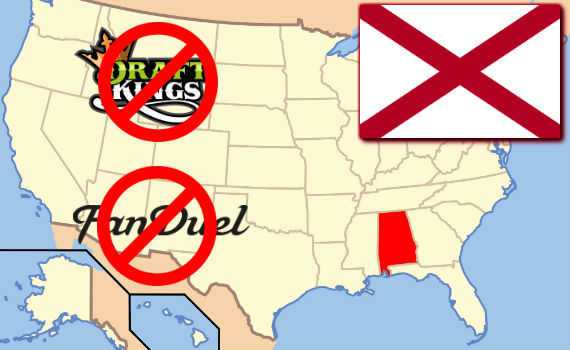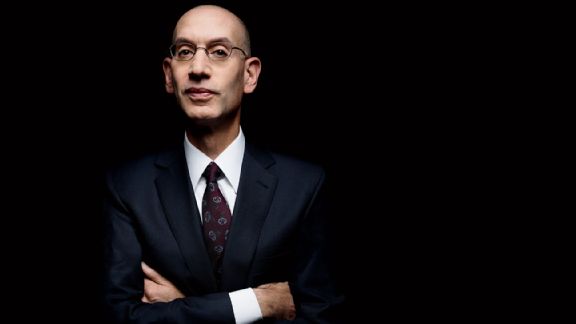DFS in Alabama Illegal According to AG

State Attorney General Luther Strange claimed DFS in Alabama illegal and sent letters for daily fantasy sports operators DraftKings and FanDuel demanding to stop their respective businesses in the Heart of Dixie.
After declaring DFS illegal in Alabama, AG Strange ordered DraftKings and FanDuel to stop their real money operation in the state by May 1. He argued that real money daily fantasy contests qualify as illegal gambling according to Alabama gambling laws.
Chance influences the contests, so DFS in Alabama illegal
Latest gambling news quoted Strange, saying, “As Attorney General, it is my duty to uphold Alabama law, including the laws against illegal gambling. Daily fantasy sports operators claim that they operate legally under Alabama law. However, paid daily fantasy sports contests are in fact illegal gambling under Alabama law.”
Alabama AG tells FanDuel & DraftKings to stop paid #DFS by May 1 https://t.co/592HIMSxWO
— Darren Heitner (@DarrenHeitner) April 6, 2016
According to Alabama gambling laws, illegal gambling also occurs when somebody makes a wager on a contest of chance, even if skill is involved. Strange argues that skill is needed to assemble a fantasy sport team indeed, but the bettors have no control over the performance of their fantasy players. Any unforeseen event like an injury can influence player performance, so these contests rely on chance and therefore was claimed DFS in Alabama illegal gambling.

State Attorney General Luther Strange claimed DFS in Alabama illegal and sent letters for daily fantasy sports operators DraftKings and FanDuel demanding to stop their respective businesses in the Heart of Dixie.
After declaring DFS illegal in Alabama, AG Strange ordered DraftKings and FanDuel to stop their real money operation in the state by May 1. He argued that real money daily fantasy contests qualify as illegal gambling according to Alabama gambling laws.
Chance influences the contests, so DFS in Alabama illegal
Latest gambling news quoted Strange, saying, “As Attorney General, it is my duty to uphold Alabama law, including the laws against illegal gambling. Daily fantasy sports operators claim that they operate legally under Alabama law. However, paid daily fantasy sports contests are in fact illegal gambling under Alabama law.”
Alabama AG tells FanDuel & DraftKings to stop paid #DFS by May 1 https://t.co/592HIMSxWO
— Darren Heitner (@DarrenHeitner) April 6, 2016
According to Alabama gambling laws, illegal gambling also occurs when somebody makes a wager on a contest of chance, even if skill is involved. Strange argues that skill is needed to assemble a fantasy sport team indeed, but the bettors have no control over the performance of their fantasy players. Any unforeseen event like an injury can influence player performance, so these contests rely on chance and therefore was claimed DFS in Alabama illegal gambling.
NBA Commissioner Calls for Regulation of DFS, Sports Betting

Said Silver on FiveThirtyEight’s Hot Takedown podcast: “My view is that daily fantasy should be a regulated industry in New York and elsewhere, and I think ultimately that should be a decision for the voters.”
Silver is the first head of a major sports league to comment on the ongoing DFS controversy, and the most outspoken advocate of legal sports gambling. He made his opinion first known in October, when he told ESPN that the NBA is not considering “withdrawing or backing off our relationship with the [DFS] industry”, and that “it’s something that we’re deeply engaged in on the broader subject of daily fantasy-slash-sports betting.” He also had written a New York Times piece about why sports betting should be legalized shortly after entering into an equity deal with FanDuel.
Does the NBA commissioner consider DFS gambling?
The most pressing question in American gambling laws right now is whether DFS is a game of skill, or of chance. Silver declined to discuss whether he believes that DFS constitutes as gambling or not, but did say that the legalization and regulation of both DFS and sports gambling would be in the best interest of major sports leagues.
Said the NBA commissioner: “One of the reasons I’ve been pushing to legalize sports betting is not because that I’m necessarily an advocate of sports betting, it’s because all the research shows that it’s a multi-hundred-billion dollar business just in the United States right now.”
“In terms of the integrity of the sports league, it’s only bad news for us when it continues to remain underground… [to] the extent there are fantasy sites or flat-out betting sites, where consumers identify themselves by putting credit cards in and then can be tracked the same way the stock market can track buying and selling, then that’s much healthier for the leagues.”


Said Silver on FiveThirtyEight’s Hot Takedown podcast: “My view is that daily fantasy should be a regulated industry in New York and elsewhere, and I think ultimately that should be a decision for the voters.”
Silver is the first head of a major sports league to comment on the ongoing DFS controversy, and the most outspoken advocate of legal sports gambling. He made his opinion first known in October, when he told ESPN that the NBA is not considering “withdrawing or backing off our relationship with the [DFS] industry”, and that “it’s something that we’re deeply engaged in on the broader subject of daily fantasy-slash-sports betting.” He also had written a New York Times piece about why sports betting should be legalized shortly after entering into an equity deal with FanDuel.
Does the NBA commissioner consider DFS gambling?
The most pressing question in American gambling laws right now is whether DFS is a game of skill, or of chance. Silver declined to discuss whether he believes that DFS constitutes as gambling or not, but did say that the legalization and regulation of both DFS and sports gambling would be in the best interest of major sports leagues.
Said the NBA commissioner: “One of the reasons I’ve been pushing to legalize sports betting is not because that I’m necessarily an advocate of sports betting, it’s because all the research shows that it’s a multi-hundred-billion dollar business just in the United States right now.”
“In terms of the integrity of the sports league, it’s only bad news for us when it continues to remain underground… [to] the extent there are fantasy sites or flat-out betting sites, where consumers identify themselves by putting credit cards in and then can be tracked the same way the stock market can track buying and selling, then that’s much healthier for the leagues.”





